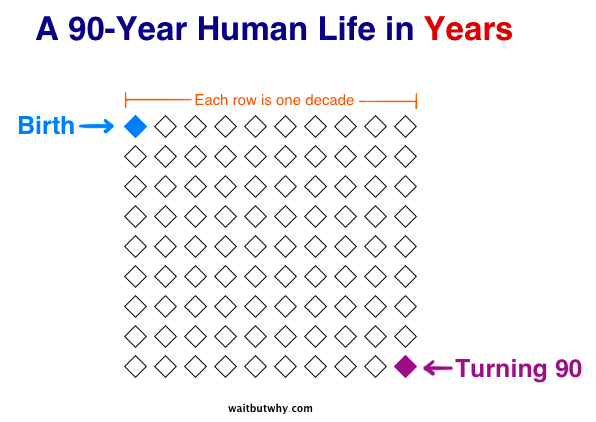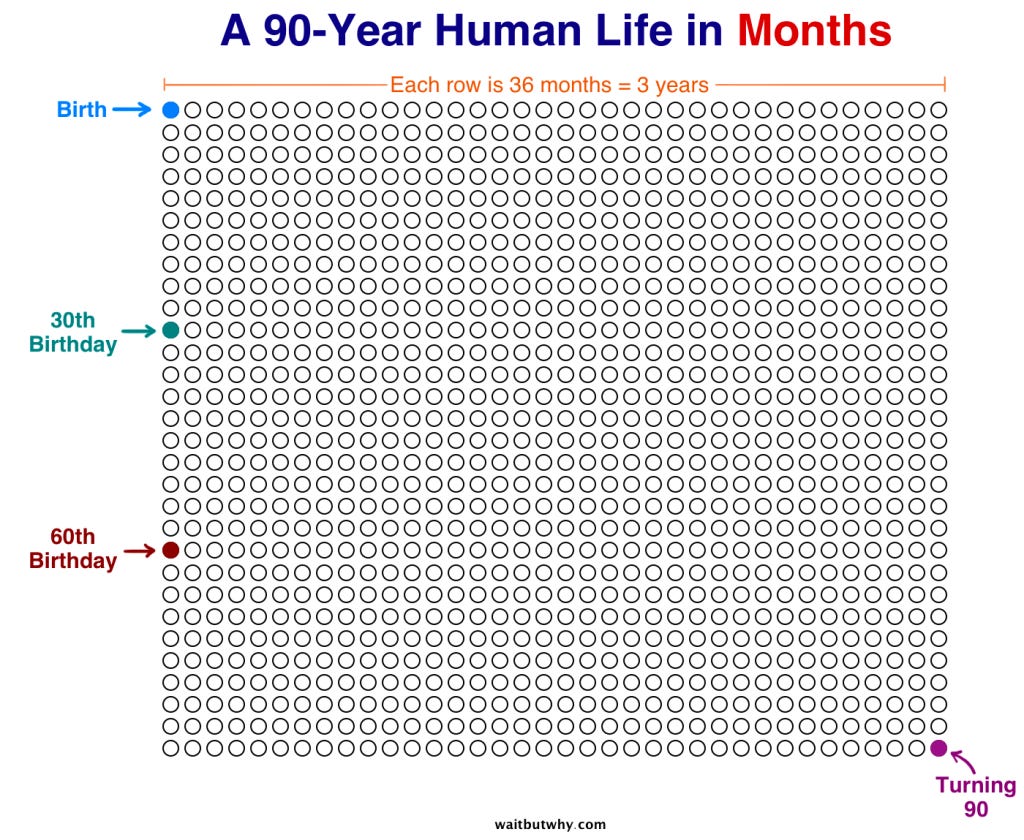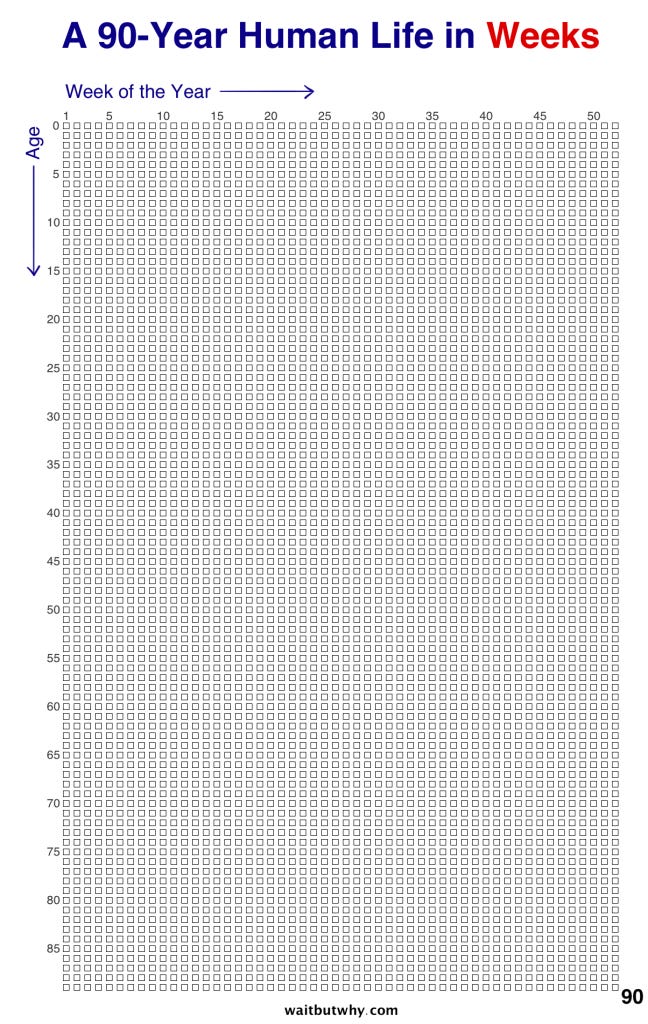Obedience & Learning, Servanthood to God, Framework for Visualizing Time
The Disciple-Leader Newsletter #56
DISCIPLESHIP
“An ounce of obedience is better than a ton of learning.”
Charles Spurgeon
The following parable was taken from this sermon by Noah Herrin.
"Imagine if I was still living at home, and my dad, before he left for work, said, 'Noah, before I come home from work today, I need you to make sure all the trash is taken out.'
"Imagine that's what he told me. And I said, 'Okay, Dad, I got you.' Then my dad comes home 8 hours later, walks in the door, and all the trash is still in the trash cans. Imagine he comes in and he's like, 'Noah, why is the trash still in the trash cans and not outside?'
"Imagine if I responded like this, 'Well Dad, you see, I got your message. In fact, I memorized your message. Take out the trash before I get home today. I also memorized it in a more relevant translation. I memorized it. I even put some essential oils on for a little while and I thought about the message that you gave me, I tweeted about the message that you gave me. I even found a podcast that was all about the Nashville (where he's located) sewage system and how you should take the trash out, and what they do with the trash. It was amazing!' And my dad is standing there in front of me and says, 'But you didn't do anything!"
Do you see how silly this is?
This is a parable about Heavenly Father and us.
One writer put it, "We are a lot more educated than we are obedient." In the church that I'm a member of—The Church of Jesus Christ of Latter-day Saints—we talk all the time about ministering. We study it, we have talks and lessons on it, we devise plans about the best and most effective ways to do it. But do we do it?
Remember what James taught, "Do not merely listen to the word, and so deceive yourselves. Do what it says. Anyone who listens to the word but does not do what it says is like someone who looks at his face in a mirror and, after looking at himself, goes away and immediately forgets what he looks like.But whoever looks intently into the perfect law that gives freedom, and continues in it—not forgetting what they have heard, but doing it—they will be blessed in what they do" (James 1:22-25, NIV).
Or as he put it another way, "Faith without works is dead."
LEADERSHIP
“James, a servant of God and of the Lord Jesus Christ.”
James 1:1
Many people don't realize that James, the author of the book of James, is the biological half-brother of Jesus. They had the same biological mom—Mary.
The book of James is one of the best leadership texts you'll find anywhere. And it all starts with the first verse. "James, a servant of God and of the Lord Jesus Christ." James was very popular. He had a lot of notoriety in Jerusalem. Not only was he the brother of the most famous figure in the history of the world, but he was a leader of the church in Jerusalem. He had a lot of identities, yet, he wanted to be known for his servanthood to God.
The standard of leadership exemplified by Jesus was hallmarked by servanthood to God and its natural fruit—service to others.
"I can of mine own self do nothing: as I hear, I judge: and my judgment is just; because I seek not mine own will, but the will of the Father which hath sent me" (John 5:30).
"For I came down from heaven, not to do mine own will, but the will of him that sent me" (John 6:38).
Where there is no service, there is no leadership. Or as one writer put it, "If service is beneath you, leadership is beyond you."
James grounded his identity in the one thing that makes life most joyous: servanthood to God. Today's culture would have you ground your identity in the one thing that makes life most empty: servanthood to self.
So how can you approach servanthood to God and avoid servanthood to self
Consider this teaching from John Pingree: "We can approach decision points in our lives—like what to study, what to do for work, or where to live—in the context of helping others." I think you can extend that further. Filter big life decisions through the lens of "How can I best serve God and others?" Filter daily decisions through the lens of "How can I best serve God and others?"
Your answer to these questions will always yield the highest, happiest, and holiest fruit. Living your life based on your answers to these questions is how to be a leader in the way that Christ defined leadership—through service.
MENTAL PERFORMANCE
“By small and simple things are great things brought to pass.”
Alma 37:6
Have you ever considered how short life really is? You probably have. Have you ever observed it visually?
This is what your life looks like in weeks, months, and years. (Taken from Tim Urban).
Kind of crazy to see it like that, right? Getting a clear picture on how short your life is might clarify some things. It might make you want to prioritize things you've been putting off, and put off things you've been prioritizing.
I love what Michael Crichton wrote, “A day is like a whole life. You start out doing one thing, but end up doing something else, plan to run an errand, but never get there. … And at the end of your life, your whole existence has that same haphazard quality, too. Your whole life has the same shape as a single day.”
Think of the circles already filled in on your life's calendar. What story do those circles tell?
I recently came across a model of how to think of my time that is very helpful. This is from writer Tim Urban, on how he frames time to motivate him to exercise more:
"After the past few years of barely doing any exercise, I started a routine working out M-F morning for 30 min. It's awful and I hate it. But here's how I've been framing it in my head: There are ~225 waking half-hour blocks every week, each of which will be experienced separately by me. Which is kind of like 225 Tims, each experiencing a half hour of life each week.
"The difference between being someone who exercises and someone who doesn't only affects 5 of those Tims—in both cases, the other 220 are chilling out. Because those 5 Tims are willing to suffer, the other 220 Tims all get to feel better about themselves, feel and look healthier, and not experience any 'it's really bad that I never exercise' guilt.
"A bit weird way to think about it, I know, but it has been motivating for me. When I'm miserably working out, I remind myself 'this is making life better for 220 other Tims this week."
What have you been procrastinating doing? What changes do you need to make in your life? For Tim Urban, it was exercise. What is it for you? Framing time in this manner—225 waking half-hour blocks per week—will help you in your efforts to be consistent.
Disciple-Leadership: Jesus-led. Lead like Jesus.









